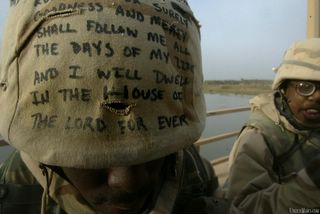goodness and mercy

Is this site genuine? It purports to be images of the war uploaded by US troops, offering us a glimpse into their war story, through photos they've taken and uploaded via email: Kaleidescopic and seemingly unedited views of the war in Iraq as seen by some US citizen-participants. Surely newsworthy or worthy of investigation.
It's that pesky problem of images again. Some of the 1,024 offered just don't measure up to US media standards of decorum. There's a full range, from the picturesque, affectionate and jocular to quite a few that no self-respecting US news organ would or could carry. These begin on or about page 52 (you have been warned), and they baffle our ever so civilized sensibilities - not just in what they represent, but through the spirit of the representing, as conveyed via caption and depiction.
The question of the genuineness of the site is important, for if it is what it claims to be, it is a primary source for those far from the war to begin to see it through various soldiers' eyes -- instead of through those of embedded reporters, or ideologues of whatever persuasion -- and to see what lies behind those eyes, glimpsed in an unpolished mirror of the war.
The site, entitled Under Mars, is the sort of thing US media should not be able to ignore if they aspire to the gold ring of credibility. Its existence was noted on blogs a while ago, and reported in the Australian press the other day, and is now being linked by various blogs. It contains photos dated back to 2003. They are not in chronological order, and the names of the photographers are not included.
Under Mars could be what it claims to be: an open wound, offering unembedded fragments of freedom on the march. It could be agitprop. What's beyond question is the need to address this question. US news institutions that ignore it risk having no face left to save.
[Parenthetical afterthought: To me, this is relevant to Jack Shafer's saying "I think most practicing journalists today are as Webby as any blogger you care to name." Shafer sees that US news institutions have access to information. Among other things, he fails to see the elaborate system of rhetorical customs, conventions and constraints that govern not only how sources are used, but whether they can be acknowledged or presented, i.e., "seen." The ongoing debate between blogs and journos has more to do with niceties of decorum than with standards of credibility and truthtelling.]

1 Comments:
Hey C. - no need to remind me who you are - where did Blogalization go? I keep getting some oddness when I try to go to it.
I know you are being a bit pajama-ish yourself in painting all blogeurs with the broad brush, while holding up the only definition of journalism worth a damn.
Journalism is very hard to practice because one does not always turn up new primary sources, or know how to read them when one does. Or bother to look at them, as in the case of Under Mars, when they are right in front of Journalism's nose.
If US journalism were honest, it would pay people who can read and communicate in the languages of the world it is supposed to be discovering. Instead it almost never shows any awareness of the difficulties of translating, say, Arab or African "views" of the US. By failing to acknowledge the problem of beginning to translate, US journalism reveals that it has ceased trying to access anything at primary source level. It is content to regurgitate what someone else wants to be the case. US interests intact.
I hope you are liking it there.
Post a Comment
<< Home